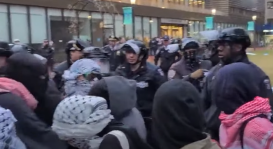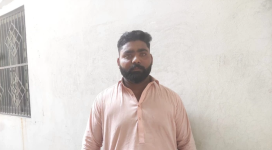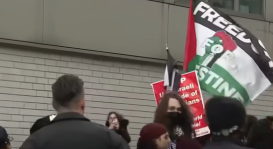LOUISVILLE - With opinions flying around the church about an unprecedented special meeting of the 214th General Assembly - which would be the first in Presbyterian Church (USA) history - the Office of the General Assembly has issued an "FAQ" (frequently asked questions) on the matter.
In the meantime, the session of Westminster Presbyterian Church in Canton, OH, has filed a complaint with the General Assembly Permanent Judicial Commission (PJC) Jan. 21, charging that denominational officials have violated The Book of Order by not calling the special session.
The complaint, filed by Paul Rolf Jensen, an attorney in Reston, VA, names the Office of the Stated Clerk of the General Assembly, the Office of the Moderator of the General Assembly, the Committee on the Office of the General Assembly, Fahed Abu-Akel as Moderator of the General Assembly and Clifton Kirkpatrick as Stated Clerk of the General Assembly and says they have "conspired together and acted contrary to the polity of the Presbyterian Church (USA) to prevent the 214th General Assembly from being recalled into special session."
The complaint demands that the "conspirators" cease "all efforts to resist" calling the special session.
The Rev. Gradye Parsons, director of operations for the Office of the General Assembly (OGA), called the Westminster complaint "premature at best." Parsons said the OGA is working as fast as it can to verify the 57 signatures on a petition given to Abu-Akel last week by Alex Metherell, a surgeon in Laguna Beach, CA, asking for the special Assembly. "We have not not done what the complaint says," Parsons told the Presbyterian News Service, adding that the verification of the signatures on the petition should be completed "by the end of this week."
He said the executive committee of the General Assembly PJC meets Jan. 24 and will address the Westminster complaint.
Jensen has also filed more than 20 complaints all around the country, alleging defiance of the constitution - particularly G-6.0106b (the commonly called "fidelity and chastity" clause) - by individuals, sessions and presbyteries. He and Metherell are both members of the same congregation in Los Ranchos Presbytery in southern California. Metherell was an elder commissioner from that presbytery to the 214th General Assembly.
The full text of the OGA "Frequently Asked Questions" paper, dated Jan. 21:
Frequently Asked Questions
Many conversations are taking place across the denomination regarding the possibility of a called special assembly. What follows are answers to the most frequently asked questions about a special assembly.
Q: What are the rights and duties of the Moderator regarding a called special assembly?
A: The Book of Order (G-13.0104) says that the Moderator "shall" call a special assembly at the request of the requisite number of minister and elder commissioners. The Moderator intends to call the special assembly as soon as the Office of the General Assembly (OGA) receives verification about and from the commissioners who signed the petition.
Q: What is verification and why is it necessary?
A: Verification assures the integrity of votes and the protection of the rights of commissioners in making decisions. Verification is done in other ways in the OGA-certifying commissioners to an assembly, verifying votes on constitutional amendments, and approving the vote count for the next Moderator before the result is announced to the assembly. Verification in this situation insures that there are 25 minister and 25 elder commissioners (from the appropriate spread of presbyteries) to the 214th General Assembly who want a special assembly. This is especially important in this situation, given that some commissioners whose names are on the petition contacted the Stated Clerk within hours of the petition being presented to the Moderator, stating that their names should not be included on the petition. In addition, the presenter of the petition informed the Stated Clerk, after the presentation of the petition, that one of the names appearing on the petition should not be inclu! ded.
Q: What is the verification process?
A: On January 14th, the Moderator received the petition requesting that he call a special assembly. By the next day, the OGA was contacting stated clerks of the presbyteries in which the signers of the petition are located, asking them to verify that the commissioner(s) within their presbyteries are still in good standing. Upon receipt of this verification, the OGA sent a letter to the commissioners who had been verified, asking them to certify with their signature that they desire a special assembly.
Q: What if one or more of the commissioners cannot be reached for verification?
A: The presumption is that the signers of the petition want a special assembly. The only votes that will be counted as not favoring a special assembly will be the ones so marked and received from the commissioners indicating such.
Q: Which is correct: 60-day or 120-day notice?
A: Both are correct and required in this situation. The Book of Order (G-13.0104) requires that commissioners to a special assembly receive notice at least 60 days in advance. G-13.0112c states that all matters requiring constitutional interpretation shall be presented to the Stated Clerk 120 days prior to the convening of the assembly. The purposes listed in the petition deal only with matters related to interpreting the meaning of the Constitution for our current situation in the PC(USA). For more details, please go to "The Stated Clerk Responds."
Q: Can a special assembly still be called with a 120-day notice? If so, where will it be held?
A: Yes. The 120-day provision means that a special assembly would be convened between (no earlier than) May 15, 2003, and the beginning of the 215th General Assembly on May 24, 2003. The OGA is currently researching possible locations for a special assembly. Factors include cost and availability.
Q: When will we know if the Moderator will be calling a special assembly?
A: As soon as the OGA has received verification from commissioners who signed the petition-or the OGA has exhausted everything possible way to contact commissioners and has not been successful-and it is determined that the minimum requirements are met as outlined in question #1, the Moderator will be advised that it is in order to call a special assembly.
By Jerry L. Van Marter







